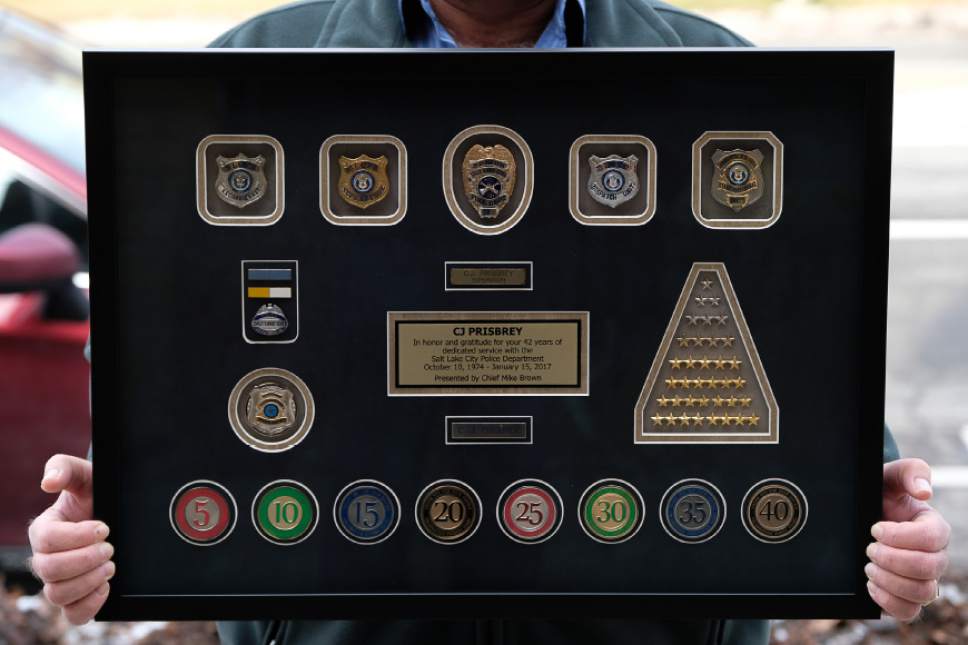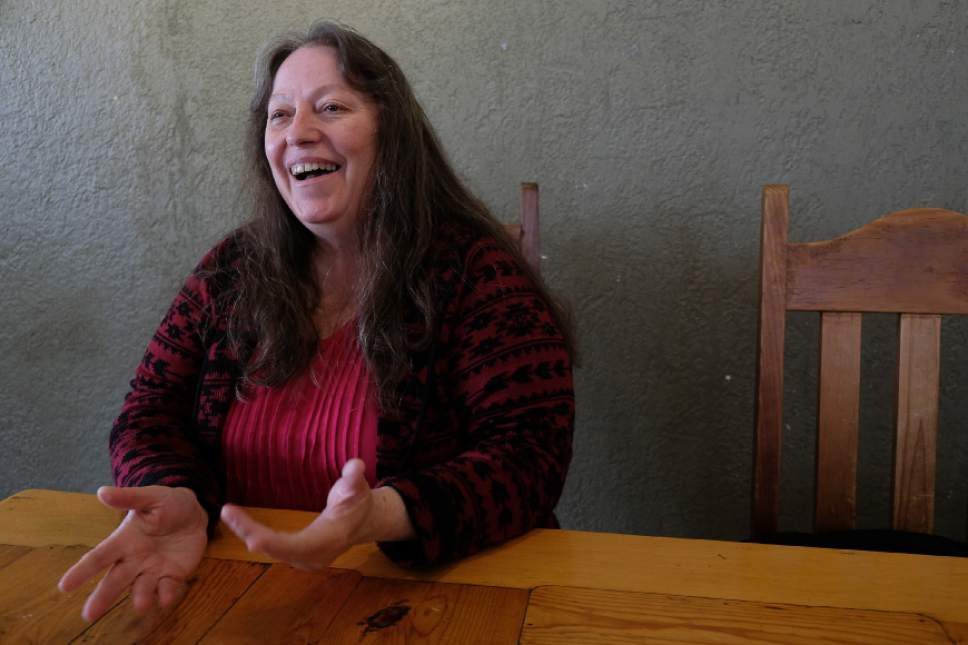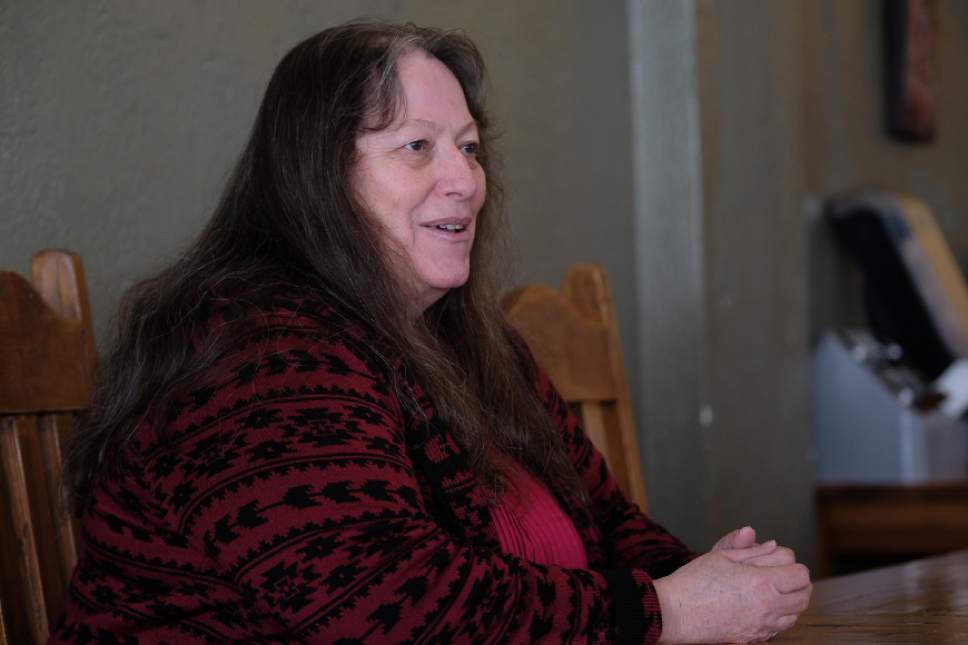This is an archived article that was published on sltrib.com in 2017, and information in the article may be outdated. It is provided only for personal research purposes and may not be reprinted.
When Carol Jane Prisbrey joined the Salt Lake City Police Department a month after her 19th birthday, her job was to answer 911 calls, write down the information on cards that were passed along to dispatchers.
Last Sunday, she ended a four-decade-long career as a supervisor in the records department, where she kept track of mountains of information, including every report coming through the police department.
After 41 and a half years and earning the title of longest-serving employee at the police department, she has retired.
"She truly made us a great place. She made us a better place, serving here for 41 years," said Salt Lake City Police Chief Mike Brown. "We value her service and recognize it and want to wish her the very best as she moves on in life."
The department had a Carol already, so Prisbrey earned a new nickname — CJ — when she started working for the police department in 1974. She spent three years as a complaint-taker, as they were called, before moving to dispatch. After 17 years working in the dispatch center, Prisbrey transferred to the records department, and spent the second half of her career as a supervisor.
At the police department's annual awards dinner in May, the department presented Prisbrey with the chief's special recognition award for her service, citing her attention to federal reporting standards and efficiency. In 1997, she also received recognition from the department for her involvement in implementing a searchable system that improved the accuracy, efficiency and collection of statistics.
Prisbrey saw the transition from handling 911 calls manually to processing them with a modern computer system.
When Prisbrey started in the dispatch center, there wasn't an official protocol for trying to keep perpetrators on the phone. But one night, Prisbrey kept a man who had broken into someone else's house on the line until the police arrived and arrested him.
"She's a little fiery. She's willing to say what's on her mind, and in that situation, it paid off," said Brown. "She took control of that situation, engaged that burglar in conversation that kept him off-guard and probably delayed or prevented someone getting hurt and gave us enough time to respond as officers and take care of the situation."
The story caught the attention of actor William Shatner, who used the recording and re-enacted the story on his 1990s reality television show, Rescue 911, in an episode called, "The Chatty Burglar" that aired on Dec. 19, 1989.
She also received an award from the Wasatch Front Law Enforcement Association for her involvement in the call.
The department still uses the video when training new hires.
Also during her time in dispatch, Prisbrey met her husband. They like to tell people they met in jail, because Denis Prisbrey — a now-retired police officer — had been booking someone into jail when she invited him to visit dispatch (at the time, the jail was in the basement of the municipal building where the dispatch center was). The two had actually known each other for seven years through the department, but Prisbrey's invitation sparked a deeper relationship.
Denis Prisbrey hadn't been able to visit her in the dispatch center, but he invited her to get coffee to "make it up to her," CJ Prisbrey said. A year later, the two got married.
She says coworkers dating isn't uncommon.
"When you're a cop or you work for the police department, it's hard explaining to people who aren't in the business what you do for a living, or why you do what you do, or the stuff you have to deal with. Some of the stuff you see and hear is heartbreaking," Prisbrey said.
Having relationships with other people in the police department helps dispatchers cope with the more traumatic stories they are exposed to. Even if someone else hadn't dealt with the same scenario, they've handled others that were similar.
"The empathy is there," said CJ Prisbrey. "When I was in dispatch, the way I handled sending [officers] on really horrible cases, is that I got mad. I got mad that that happened to that person because it's really bad if you're crying when you are dispatching; it tends to interfere. After enough years, you compartmentalize. You put it in a corner."
Working in dispatch and the records department exposed CJ Prisbrey to many tragic situations, but she also became aware of many positive interactions encountered by officers.
"You can see good things, too. When somebody saves somebody else, you see that report too. So that helps a lot," said CJ Prisbrey.
Civilians can retire after working for the department for 30 years, but she says most employees don't stay that long. She says the record department is generally a stepping stone to other things. People switch careers to higher-paying jobs with better hours that don't require weekends, holidays and midnight shifts.
CJ Prisbrey says she stayed with the department because she "just wasn't quite ready to pull the plug and I really care about the people I work with."
She added: "Plus, where else could I work where they pay me to boss cops around?"
@tiffany_mf







